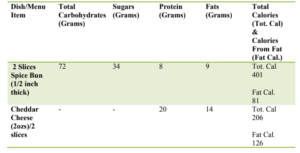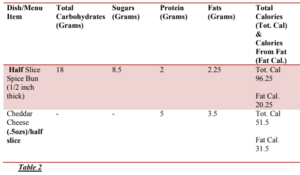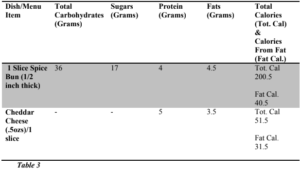This blog post was extracted from the booklet: “Easter Bun & Cheese Dietary Guidelines For Jamaicans Health & Well-Being (2018). Written By Oshane Bryant (Founder & Managing Director-O’Shane Bryant Fitness Limited) & Stacey-Ann Ricketts (BSc Dietetics & Nutrition; Dietician at University Hospital of the West Indies).
Jamaicans Love Bun & Cheese
The Easter Season for Jamaicans in Jamaica (and potentially diaspora), is one evenly balanced between the commemoration of Jesus’ resurrection, and the widespread consumption of bun & cheese. With Christianity being the popular religion in Jamaica, many Jamaicans observe the Easter season & holidays as one that ought to be holy-fasting in accordance to Lent & attending church from Holy Thursday, to the day of Easter. Many Jamaicans also hold unto the cultural identity of consuming Easter Bun (popularly made with molasses and dried fruits/raisins)
with chunks of cheddar cheese… It is said, that Bun & Cheese was introduced to Jamaica by former colonials (The British). Many Jamaicans are so much in love with Easter bun & cheese, that this meal will be the only thing on their daily menu; and/or will be consumed above ideal portions in a sitting, during the season.
Many Jamaicans are so much in love with Easter bun & cheese, that this meal will be the only thing on their daily menu; and/or will be consumed above ideal portions in a sitting, during the season.
Table 1: Typical bun & cheese portions eaten by Jamaicans in a sitting, and their macro nutrient & calorie contributions
Macro-Nutritionally, the table above highlight that the bun & cheese meal, is one high in carbohydrates & fat; and given the portions (2, half inch thick slices bun & 2 slices of 1 oz. cheese), combined, contributes to 607 calories (of which 207 calories/23 grams is from fat). Now while it may appear that the calorie contribution isn’t significant, especially for a person on a 2000 calorie per day diet, this serving size has pretty much given you approximately 33% to 50% of fat for the day (23 grams). You only need roughly 44-77 grams fat for a person on a 2000 calorie daily diet, according to the Dietary Reference Intake).
As discussed in the intro, for many Jamaicans, bun & cheese is the only meal eaten for breakfast, lunch & dinner during the season. So given this reality, and the reality of the typical portions consumed in a single sitting, 3 times per day, Jamaicans can expect to consume approximately 1821 calories (3 typical servings of bun & cheese daily): of which, 621calories/ 69 grams is from fat (3 typical servings of bun & cheese daily). This amount of fat consumption in a given day, is at the least, satisfying the average Jamaican daily recommended limit of fat intake (The daily recommended limit of fat intake for a person on a 2000 calorie per day diet, is 44-77 grams). Add to that the dominant kind of fat (saturated &
hydrogenated—‘bad fats’), the health implications are great. Both of these fats are known for contributing to a build-up of LDL Cholesterol (‘bad cholesterol’).
High LDL blood cholesterol is regarded as a contributor for:
- Arteriosclerosis (hardening of arterial walls).
- Atherosclerosis (deposition of fatty plaque inside arteries thus causing narrowing, and increasing risk for hypertension, stroke or heart attack).
- Diabetes–specifically type 2 through insulin resistance.
This amount of fat consumption in a given day, is at the least, satisfying the average Jamaican daily recommended limit of fat intake (The daily recommended limit of fat intake for a person on a 2000 calorie per day diet, is 44-77 grams). Add to that the dominant kind of fat (saturated &
hydrogenated—‘bad fats’), the health implications are great.
Approximate Sodium Content of Bun & Cheese & Dietary Implications
For Jamaicans with diabetes, hypertension, and who are obese, the portioning of bun & cheese outlined above isn’t safe for you. And for those Jamaicans without these conditions, but with a family history of hypertension, obesity and diabetes, the portions of bun & cheese outlined above should be reduced for both in a single sitting, and over a given day and week. Again, bun & cheese is a high fat, high carb meal; meaning therefore that diabetics and obese persons ought to eat this meal sparingly, and/or consume ‘healthier bun versions’ such as wheat varieties (also sparingly, or within recommended portions as outlined by a dietary professional).
Bun & cheese is also a meal high in sodium. Two, half inch thick slices of bun, with 1oz of cheese, can contribute approximately 300-350mg of sodium (salt). This is equivalent to approximately 1⁄4 teaspoon of salt. Consuming this said portion of bun & cheese 3 times a day, is giving you nearly 3⁄4 teaspoon of salt. Don’t think this is a lot of salt? Mix this amount of salt in an 8oz glass of water and taste it. Combining the amount of salt, sugar and fat bun and cheese contributes to the typical Jamaican diet in a day, and the number of Jamaicans living with a lifestyle-related disease, reducing the portion, and/or consuming wheat-bun, and/or in extreme cases (where advice is given to you by your personal doctor, or similar, to avoid bun & cheese), should be the dietary methods to follow.
Bun & cheese is also a meal high in sodium. Two, half inch thick slices of bun, with 1oz of cheese, can contribute approximately 300-350mg of sodium (salt). This is equivalent to approximately 1⁄4 teaspoon of salt. Consuming this said portion of bun & cheese 3 times a day, is giving you nearly 3⁄4 teaspoon of salt.
Table 2: General ideal bun & cheese portion to be eaten by Jamaicans with hypertension, diabetes, and obesity; as well as their macro nutrient & calorie contributions
Table 3: general ideal bun & cheese portion to be eaten by
Jamaicans with a family history of hypertension, diabetes & in a single sitting; as well as their macronutrient & calorie contributions
Key Takeaway Points
- Bun & Cheese is a high fat, high carb, high sodium meal that should be eaten in
moderation and sparingly-particularly amongst Jamaicans who are: hypertensive,
diabetic, obese, and/or with a family history of one or all these conditions; in the
Easter season, and generally throughout the year. - Persons with diabetes, hypertension, or obesity, should adhere to the portion
guidelines of table 2 (herein), and should incorporate other meals in their day that gives them
other nutrients & health benefits (vitamins, minerals, protein, fiber) with less of a
contribution of fat, simple sugars & sodium. Examples include: fruits, leafy green
vegetables, carrots, oats, tubers (sweet potatoes), brown rice, steamed fish, roasted
poultry/beef/pork. For portioning details of these meals, feel free to contact us at
O’Shane Bryant Fitness Limited,To discuss further: 876-870-7812 or email
obfitness4u@gmail.com - Persons with a family history of hypertension, diabetes and obesity (having a
minimum of 1 of these conditions) should adhere to the portion guidelines outlined in
table 3 herein.
It’s important to note that the guidelines herein are for general educational purposes, and does not superimpose advice given to the reader by his/her healthcare practitioner. The authors, O’Shane Bryant Fitness Limited, it’s employees & partners cannot be held responsible for any adverse event that may occur to the reader, following his/her usage of the content herein.
Your Sustainable Fitness Partner.
About The Author

Oshane Bryant: BSc Geology, Geography Minor; ACE CPT since 2012; Jamaica Business Development Corporation (JBDC) Accelerator Graduate-2018 cohort; Licensed KUKIBO Martial Arts & Self Defense, Senior Instructor; OB Fitness Founder & Managing Director.












